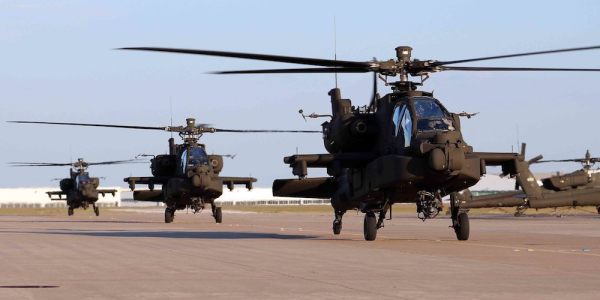

This story has been updated.
Boeing’s AH-64 Apache helicopter is the aerial attack dog of the U.S. Army, its M230 chain gun designed to perforate and intimidate targets in the field. But after three decades, the Army’s putting the attack copter on ice ahead of a come-to-Jesus moment — so to speak.
The Army in February ceased accepting deliveries of the AH-64E Apache variant from Boeing due to concerns over a “critical safety” issue, Defense News first reported on April 19 — namely, a lack of confidence in the strap pack nut that keeps rotor blades from tearing loose from the copter mid-flight.
“We stopped accepting deliveries of new AH-64 Echoes because of a strap pack nut that we believe to be really suspect,” Brig. Gen. Thomas Todd told Defense News, adding that Boeing had pursued a redesign of the faulty component at a “very thorough but expeditious pace over the last six months.”
The failure of such small and crucial item likely caused the in-flight rotor separation and crash of an Apache in Galveston, Texas on December 28, 2016, killing both soldiers on board. That incident involved an AH-64D variant of the attack copter that’s endured some 90 mishaps in the last decade.
U.S. Army/Spc. Alajuwan D. McCoy

Three new AH-64E Apache helicopters taxi onto the 7th Squadron, 17th Cavalry Regiment Heavy Attack Reconnaissance Squadron’s flight line March 22, 2014, at the Hood Army Air Field in Fort Hood, Texas.
The AH-64E variant, the last Apache model procured from Boeing before the Army committed to its Future Vertical Lift program, has seen its own share of technical problems. According to data compiled by Military Times, the Echo was involved in at least 7 of the 133 aviation mishaps that have occurred since 2013, the same year the Army first accepted the chopper into its fleet. As recently as April 7, two soldiers were killed when their Echo crashed during a routine training mission near Fort Campbell, Kentucky.
Nut failure isn’t a new problem for the Apache: A magnetic-particle examination of the Army’s grounded fleet following a crash of the newly-adopted Apache in 1987 revealed several cracked rotor hub retention nuts, according to 1992 report from U.S. Army Aviation Systems Command (the predecessor to the modern Army Aviation and Missile Command). Although the issue was traced back to a fabrication problem, the nut failure may conjure shades of the growing pains that first plagued the fleet decades ago.
But the freeze is particularly startling amid the U.S. military’s growing aviation mishap crisis, one that’s killed more service members than those killed while serving in Afghanistan under the Operation Freedom’s Sentinel mission in the past year. It also comes at a bad time for the Army’s broader helo fleet: a July 2017 Pentagon inspector general audit found that AMCOM “did not effectively manage airframe condition evaluations” for the UH-60 Black Hawk utility copters and its HH-60M MEDEVAC variant.
Related: The Biggest Problems Facing Military Aviation, According To An Army Aviator »
The problems facing the Army’s Apache AH-64E fleet will only worsen the Army’s aviation crisis. After all, “fewer flyable aircraft mean that pilots are flying fewer hours, especially non-deployed units,” as Army aviator Crispin Burke observed at The Long March on April 11. “Less training, in turn, can equal more mistakes.” One shortage feeds the other — a problem that both the Army and Boeing are clearly working overtime to address.
“Airworthiness and safety of our fleet is paramount. We put nothing higher than that,” Todd told Defense News. “We expect Boeing as well as anybody that provides a product to the U.S. Army to put a good-faith effort forward in addressing efforts like this any time, and again we look forward to returning a great capability of the Echo model to the fleet soon.”
WATCH NEXT:
CORRECTION: An earlier version of this article incorrectly compared the strap pack nut to the main rotor retaining nut (like the “Jesus nut” on the UH-1 Iroquois, as in “Jesus keep me safe from catastrophic failure”). Thanks to Army aviator Crispin Burke and maintenance manager Jordan Yothers, and we regret the error. (Updated 4/21/2018; 4:41 pm EST)